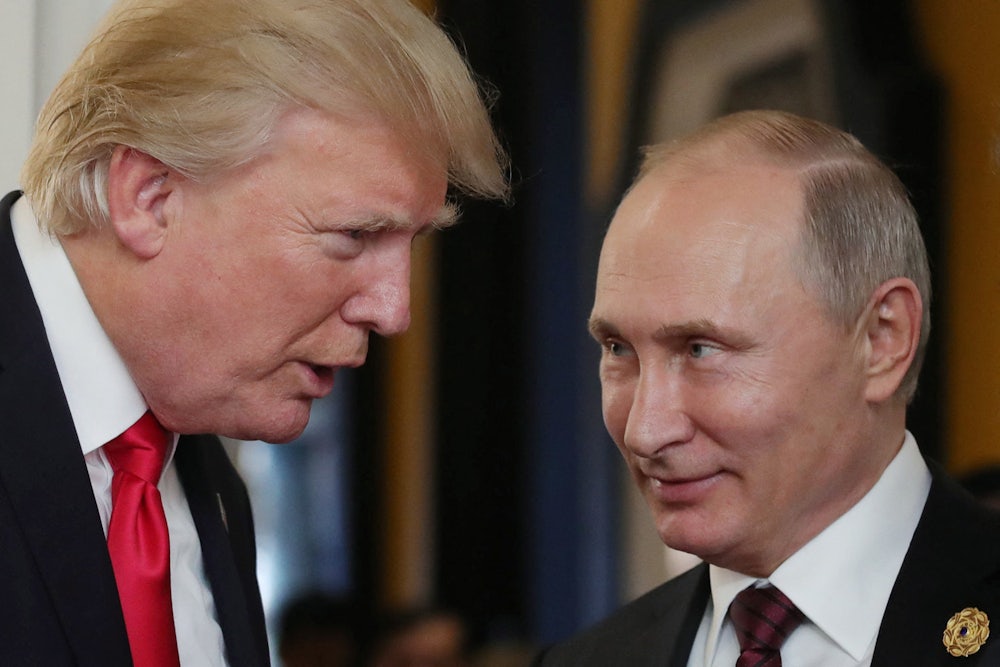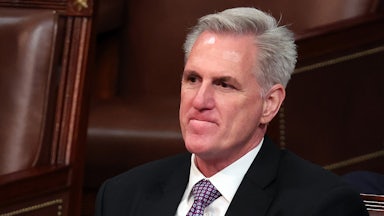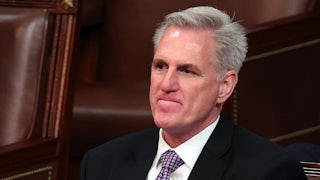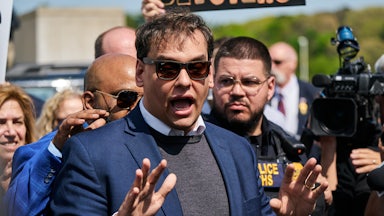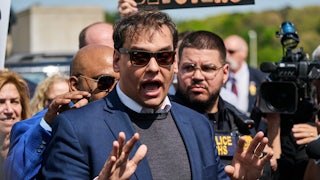Speaking to Steve Bannon as Russian troops massed along Ukraine’s border last month, former elite globalist and current Ohio senatorial candidate J.D. Vance made the case that what was about to happen—an illegal invasion of a democratic nation—was really none of our business. He “did not serve in the Marine Corps to go and fight Vladimir Putin because he didn’t believe in transgender rights, which is what the U.S. State Department is saying is a major problem with Russia,” Vance said.
“I don’t really care what happens to Ukraine one way or another,” Vance said. “I do care about the fact that in my community right now the leading cause of death among 18-to-45-year-olds is Mexican fentanyl that’s coming across the southern border.”
“I gotta be honest with you, I don’t really care what happens to Ukraine…I do care about the fact that in my community right now the leading cause of death among 18-45 year olds is Mexican fentanyl that’s coming across the southern border.” - @JDVance1 #OHSen pic.twitter.com/nf6MUzdWM5
— JD Vance for U.S. Senate Press (@JDVancePress) February 19, 2022
Currently struggling to gain traction in the primary, in part because of past critical comments about Donald Trump, Vance has endeavored to out-MAGA his rivals—a daunting task, given that his biggest rival in the contest is Josh Mandel, who has in the past argued that Ilhan Omar should be deported, as well as vociferously backing false claims about the 2020 election being stolen. But Vance was also echoing several figures in the neo-isolationist, post-Trump right who argue that while the United States has so many problems within its own borders, who cares if Putin wants to invade someone else’s?
While Vance was spouting off to Steve Bannon, Tucker Carlson was devoting several segments on his nightly Fox News show to argue that, if anything, we should be on Russia’s side. After all, the real enemy was here at home: progressives who try to “cancel” their political opponents. “Why do I hate Putin so much?” Carlson asked. “Has Putin ever called me a racist? Has he threatened to get me fired for disagreeing with him?” Carlson’s colleague Laura Ingraham, meanwhile, used her perch to suggest that the pending invasion was really the fault of the Mueller investigation—after all, if Trump, who famously coddled Putin at every opportunity, was still in office he somehow would have stopped this. And then there was Trump himself, who praised the then-pending invasion as “genius” and “savvy.”
As I argued earlier this month, all of these right-wing luminaries have been mugged by reality now that the invasion is underway and its horrors are on full display. All have been harshly condemned for their words; Vance himself has slid further down the polls and was recently disinvited from a keynote appearance at Minnesota’s GOP Lincoln-Reagan fundraiser. None of this should be surprising: Vladimir Putin is not a popular figure in America; the invasion of Ukraine is horrific and tragic, and most voters understand this to be the case. In general, polling suggests that Americans want to do more to end Putin’s incursion, not less, and that the Biden administration’s approach—to aid Ukraine without committing American troops—is broadly in line with public sentiment.
Straining to find the MAGA angle on Ukraine has only put Vance, Carlson, Bannon, Ingraham, and Trump at a distance from the popular sentiment. It may have been inevitable: Trump’s “America First” foreign policy has always been rather hazily defined, more aspirational than operational, a retread of the old Father Coughlin–esque isolationist cant. America’s problems—and its enemies, in this case liberals and progressives—are at home. Costly spending on both foreign wars and the furthering of alliances is a waste: Why should Ukraine be getting the benefits of America’s wealth and military might?
Trump, of course, practiced foreign policy with a personal wrinkle: America’s power, as he wielded it, was used to operate an extortion and protection racket. NATO allies would have to cough up if they wanted U.S. protection, while the military would ransack the countries it invaded: This ultimately was the message of Trump’s “take the oil” argument in Iraq. He cleared the way for kleptocrats to operate without restraint in the post-Soviet space, wreaking havoc on Western media in the process. And Trump cultivated grifters in Ukraine, which itself was the target of the very shakedown effort that got him impeached (the first time).
Trump patted himself on the back while leaving office for not starting any foreign wars, but his administration expanded aerial bombing and drone strikes; it risked kicking off a calamitous regional conflict when it assassinated Qasem Soleimani, commander of Iran’s Quds Forces. By and large, Trump’s ad hoc approach to the practice of whatever “America First” claimed to be largely left a blank space for his devotees to attempt to fill in with whatever idea was conveniently at hand. The rush to express eagerness for Ukraine to come under the Russian yoke—or even to applaud Putin for invading a sovereign and democratic country—could be understood as an attempt to fill that America First vacuum. Vance saw an opportunity to outflank his rivals in Ohio and eagerly took it: America’s real problems are transgender activists and undocumented immigrants, after all.
But Trump’s “America First” works much better as a set of hazy ideological precepts, rather than a detailed foreign policy doctrine. Trump’s isolationist approach—coupled with the argument that we should be pillaging Iraq—was at heart a criticism of the foreign policy dogmas that had ruled post-9/11 Washington, D.C. The wars in Iraq and Afghanistan were seen by many as a mistake, but most other candidates still defended them, if often in mealy-mouthed terms. Trump dared, albeit crudely, to attack the forever wars and their architects and tapped into multiple, contradictory types of anger at them: Some were angry we had gone in at all, some were angry we were still there, and others were angry that we hadn’t done more to win. Trump’s mix of isolationism and bombast, which led to him simultaneously arguing that waging these wars was a mistake and that war crimes should have been committed to win them, tapped into these sentiments and left everyone wondering what to take seriously and what to take literally—the high-test xenophobia or the populist hurrahs.
But the politics of those wars have changed as Biden has taken over. They are still viewed as mistakes, but they are more in the rearview mirror than ever before. Though it was botched in its execution and left a humanitarian crisis behind, the U.S. withdrew from Afghanistan last summer. Biden announced the conclusion of combat operations in Iraq last December, though 2,500 troops remain in the country. Americans widely view the invasion of Ukraine, meanwhile, as unjust and support aiding Ukraine’s efforts to resist. That effort—unlike the invasion of Iraq—is widely seen as legitimate and is being supported. And it helps that Biden’s taken the view that Putin is best confronted in concert with allies and institutions rather than further military commitments. The fact that our intervention has these reasonable limits makes a difference. American public opinion might have surely shifted in the wrong direction if, for instance, American forces were caught up in the conflict. For the moment, the White House has the upper hand because the response has not been sprawling and chaotic, and Putin’s actions are so clearly beyond the pale.
But Vance and the other America Firsters never recognized that things might work against them. They essentially started to believe their own bullshit: that Donald Trump was tapping into a deep well of isolationism, rather than simply reflecting frustration with American foreign policy failures. America First will undoubtedly live on, conceivably regaining some traction if ordinary Americans feel that our response to Putin is hitting them in the wallet, but for the moment, it’s clear that it doesn’t hold the sway that many thought it did—and it seems unlikely to reverse Vance’s electoral fortunes anytime soon.
